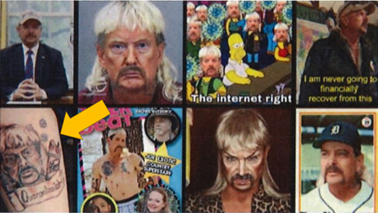In Cramer v. Netflix, Inc., 3:22-cv-131 (W.D. Pa. Sep. 18, 2023), the plaintiff brought a lawsuit alleging copyright infringement because a photograph flashed on the screen during the “Tiger King 2” documentary depicted a tattoo of the now famous “Tiger King” (a/k/a “Joe Exotic”), that the plaintiff tattoo artist had inked. Because ownership of original works, like a tattoo, vests with the author (here the tattoo artist), the tattoo artist owned the copyright in the tattoo, even though it was physically on the someone else’s body.
That tattoo in question came about as the result of a contest that the tattoo artist put on during the beginning of the Covid pandemic. Specifically, while on lockdown, she became concerned about her ability to earn income as people were unable to come in for tattoos. As a way to supplement her income, she put on a contest whereby her social media followers would buy gift certificates for future tattoos and would get to vote on one of several funny tattoos that would eventually be tattooed onto the artist’s husband. Ultimately a tattoo of Joe Exotic won the contest.
Following the success of Tiger King, Netflix created a second season to the documentary. The picture showing the tattoo was part of an 8-photo display that was on screen for approximately 2.2 seconds during one of the episodes of the second season:

The 8-way display, contextually, was among a montage of images and audio/video clips about the incredible popularity of the first season of the Tiger King documentary series.
The twists and turns of the case have some fun details, including Plaintiff demanding $10 million from Netflix in a pre-filing cease and desist letter (Netflix declined to pay), but we will focus on the legal issues. Netflix moved to dismiss the complaint on, among other grounds, fair use. The court granted the defendant’s motion and dismissed plaintiff’s infringement complaint with prejudice.
In finding in defendant’s favor, the Court weighed the different factors of the Fair Use Doctrine. Fair Use encompasses a number of factors which include purpose and character of use, nature of the work, amount and substantiality of portion used, and market effect.
First, the Court found that the purpose-and-character-of-use factor leaned in favor of Netflix. Here, the image containing the tattoo only appears after a minute plus-long narrative taking the viewer back to the time when the world was in the early stages of the pandemic. Further, when the tattoo is shown, it appears as one fraction of an 8-way split screen montage comprised of other fan art. Plaintiff, on the other hand, created the tattoo to drive income to her business. Thus, because Netflix used it for the purpose of showing the public reaction to Joe Exotic after Season One from Tiger King, which was a different purpose and character from the plaintiff’s use, the first fair use factor weighed in favor of fair use. The Cramer court further noted that the recent Andy Warhol Foundation for the Visual Arts, Inc. v. Lynn Goldsmith, et al., 143 S. Ct. 1258 (2023) weighed in favor of Netflix. It reasoned that here, unlike in Warhol, Netflix’s use of the tattoo was for a fundamentally different purpose than Plaintiff originally intended, whereas in the Andy Warhol case the two uses were identical—use as art for a commercial magazine (check out our post covering the Warhol case here).
Second, the Court found the amount-and-substantiality-of-portion-used factor in Netflix’s favor. It noted, as previously, that the tattoo appeared in an 8-way split screen montage, with visual and audio effects, and was appropriately transformative for the purpose of showing the public’s reaction to Season One.
Third, with respect to the effect of the use upon the potential market, the Court decided this factor in Netflix’s favor as well. The Court noted that Plaintiff sells tattoos and gifts while Netflix sells a streaming media service. The Court found that the respective parties have wholly unrelated products and different marketing channels and that Netflix’s use of the tattoo did not usurp the market for the original.
Finally, the Court did find that the nature-of-work factor weighed in favor of Plaintiff. When weighing the nature of the work, Courts must consider “(i) whether the work is expressive or creative … with a greater leeway being allowed to a claim of fair use where the work is factual or informational, and (ii) whether the work is published or unpublished, with the scope for fair use involving unpublished works being considerably narrower.” Blanch v. Koons, 467 F.3d 224, 256 (2d Cir. 2006). The Court has little debate over this factor as both parties agreed the tattoo was both creative and transformative.
The court then considered the unusual procedural nature of granting a motion based on the fair use doctrine on a motion to dismiss, and it found that no discovery is necessary, and that plaintiff failed to show that it required any discovery. To the contrary, the court found that it was able to fully conduct its fair use analysis and found that there were no set of facts under which it could grant relief to plaintiff. Accordingly, the court found against the tattoo artist because Netflix’s use was “fair use.”
This is yet another example of the Courts finding that fair use of a tattoo did not amount to infringement. This is a similar development as in Solid Oak Sketches, LLC v. 2K Games, Inc., 449 F. Supp. 3d 333 (S.D.N.Y. 2020). There the Court similarly noted that the tattoos appeared during gameplay and are not displayed with sufficient detail. The Solid Oak Sketches Court also found fair use to weigh in favor of the Defendant and to find that, in certain situations, the tattoo artist grants implied licenses that can provide defenses to third parties like video game makers.
Like other cases before it, this will provide further protection for individuals who have tattoos and are constantly in the media. It provides a roadmap for arguing fair use and protecting the interests of the tattooed individuals.




 />i
/>i

